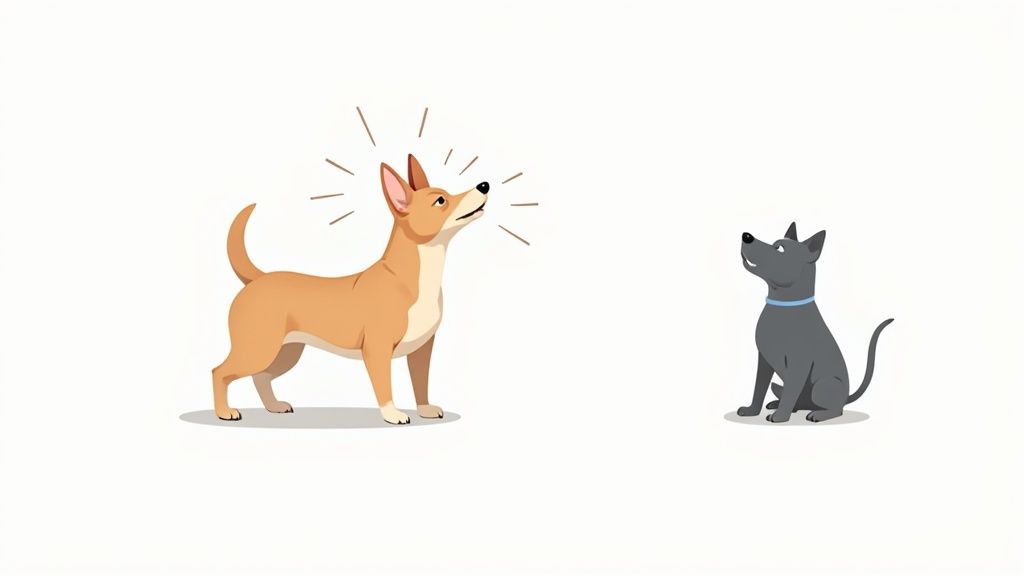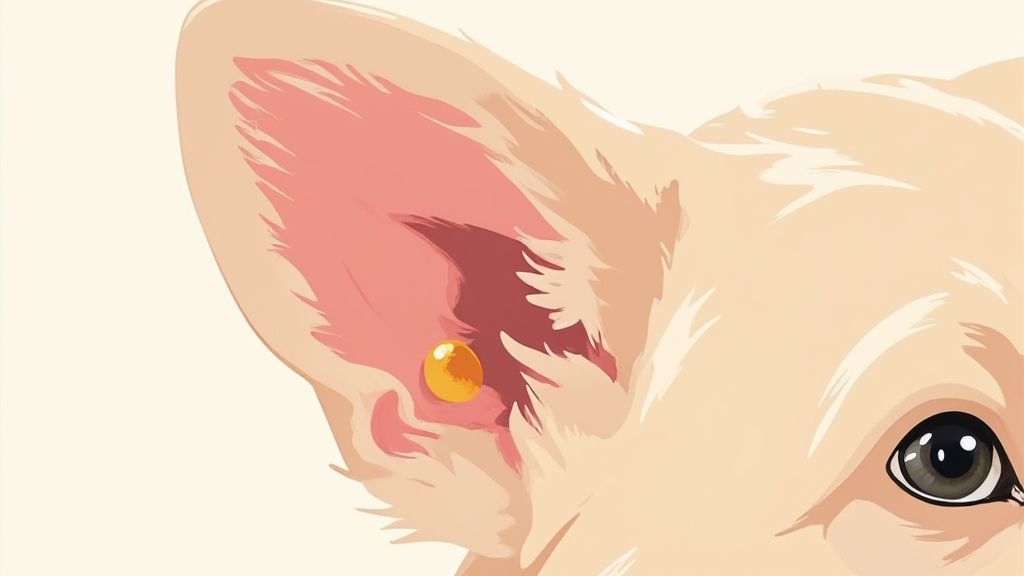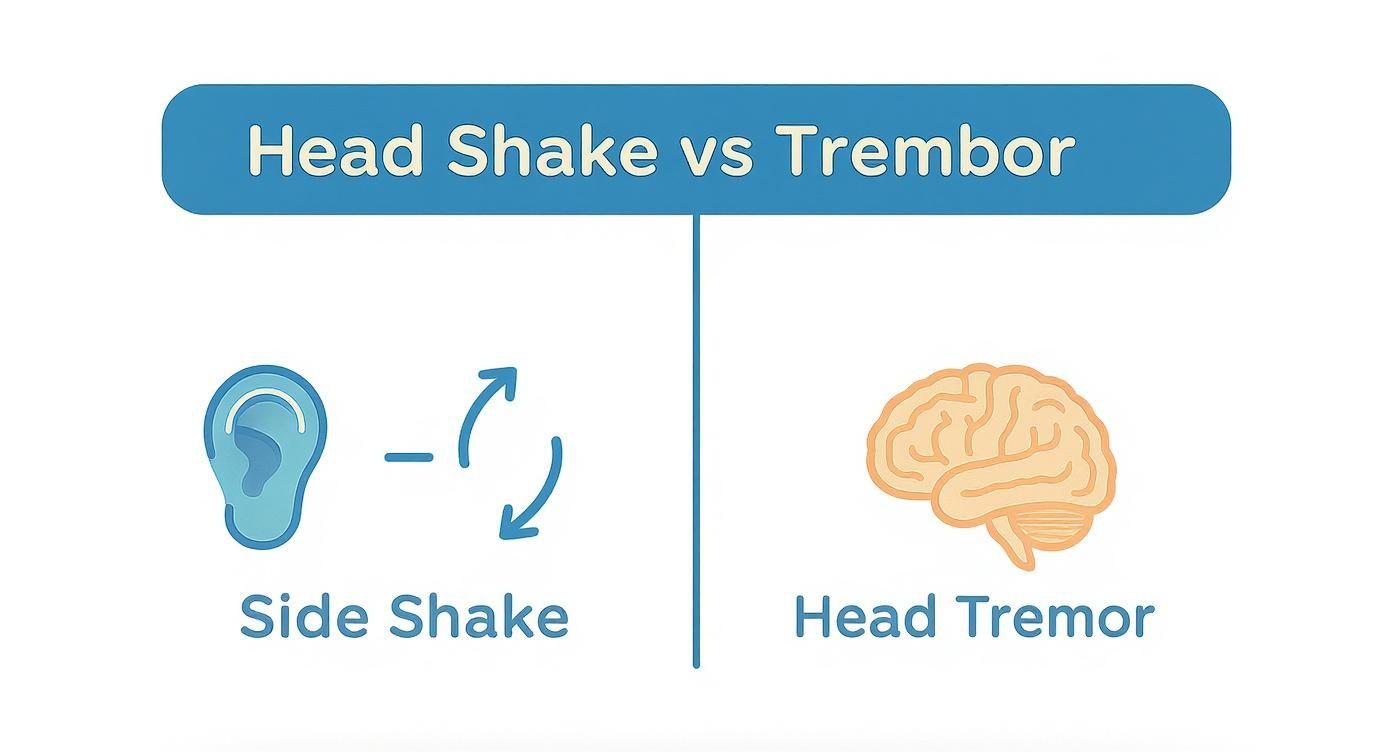Why Your Dog Keeps Shaking Her Head: A Guide from a Fellow Dog Lover
- ericavdippold
- Nov 7, 2025
- 7 min read
Hey there, fellow dog parent! You know that sound—that sudden, rhythmic flap, flap, flap of your dog's ears going wild. A quick shake after a nap or a good roll in the grass is totally normal. But when your dog keeps shaking her head over and over, it's more than just a funny quirk. It's her way of trying to tell you something's up.
That Familiar Flap: When a Head Shake Is a Red Flag

As someone who gets to hang out with pups of all shapes and sizes every day at my doggy daycare, I can spot the difference between a happy shake and a troubled one from a mile away. When it's persistent, think of that head shake as your dog's only way to shout, "Hey, something is really bothering me in here!"
This is a classic piece of doggy communication, and learning to read it is part of being a great pet parent. For a deeper dive, you can check out a guide to understanding dog body language to see how this signal fits with other cues.
In this guide, we’re going to get to the bottom of that constant flapping. We'll look at the most common culprits, from the simple to the more serious:
Itchy, irritated ears from allergies
Painful and surprisingly common ear infections
Deeper health issues that might be hiding under the surface
I'll help you figure out what you can do at home and, just as importantly, when it's absolutely time to call your vet. Let's decode that signal together.
The Most Common Culprit? An Ear Infection

Whenever a dog parent tells me their pup won't stop shaking their head, my first thought is almost always an ear infection. Honestly, it's the number one reason we see for this behavior.
Think about it this way: imagine a deep, nagging itch inside your ear that you just can’t scratch. That's what your dog is going through. The head shaking is their best, most desperate attempt to get some relief from the discomfort, pressure, and relentless itchiness.
These infections are usually sparked by an overgrowth of bacteria or yeast, which absolutely love the warm, dark, and sometimes damp environment of a dog’s ear canal. If a dog keeps shaking her head, an ear issue is the prime suspect and one of the most frequent things we hear about from owners.
Sometimes, the infection is a secondary problem. The real trigger might be anything from allergies and ear mites to a bit of water trapped after a swim. You can discover more about the causes of dog head shaking to see the full range of possibilities.
It's really important not to ignore this. All that violent shaking can cause the delicate blood vessels in the ear flap to burst, leading to a painful, puffy, blood-filled blister called an aural hematoma. This complication alone is a great reason to get things checked out by your vet sooner rather than later.
Digging a Little Deeper: Other Reasons for Head Shaking

So, if it’s not an infection, what else could be making your best friend so uncomfortable? A dog's head shake is just the outward sign that something is wrong, and it’s our job as their people to figure out the source of the irritation.
A super common trigger is allergies. Just like us, dogs can have allergic reactions to things in their environment like pollen and dust, or even ingredients in their food. This often shows up as intensely itchy skin, and their ears are a prime target for that maddening itch.
For dogs who love exploring the great outdoors, the culprit could be a foreign object. I’ve seen it all at the daycare—a tiny grass seed, a bit of twig, or the dreaded foxtail—working its way into the ear canal. This isn’t just annoying; it causes immediate and often significant distress.
Even a fun day at the lake can be the cause. Something as simple as water trapped in the ear after a swim or a bath can be incredibly irritating for a dog, leading to a lot of frantic head shaking.
It's easy to overlook, but trapped moisture is a huge reason for head shaking. It creates a damp, uncomfortable environment that can quickly go from simple irritation to a full-blown infection if you don't dry those ears properly.
Getting the hang of after-swim ear care is a game-changer. That's exactly why we put together your at-home guide to dog grooming and bathing—to give you the steps for keeping those floppy ears clean, dry, and healthy.
When It’s Not About the Ears: Spotting Neurological Issues
While most head shaking is ear-related, every once in a while, it points to something deeper. Seeing your dog’s head move uncontrollably can be really scary, but it’s important to know what you’re looking at, as it could be a sign of a neurological problem.
One of the more common neurological quirks is Idiopathic Head Tremors (IHT). This condition often looks like your dog is doing a continuous, gentle "yes" or "no" bobble-head motion. It can start and stop out of nowhere, but the key thing is that your dog usually remains completely alert and aware. We see IHT more frequently in certain breeds, like Bulldogs, Dobermans, and Boxers.
More severe shaking, however, can be a symptom of a broader issue within the central nervous system. It's really important not to dismiss this. In fact, studies on neurological tremors have found that a significant number of cases are triggered by external factors, with intoxication accounting for around 46% of incidents.
This is why a proper vet diagnosis is non-negotiable. Only a professional can run the right tests to rule out serious causes, like toxins, disease, or other underlying conditions. If you're curious to learn more about this complex field, you can delve into the wonderful world of veterinary neurology to understand these conditions better.
Head Shake vs. Head Tremor: Understanding The Difference
It's easy to confuse an ear-related head shake with a neurological head tremor. This quick table breaks down the key differences to help you tell them apart.
Symptom | Ear-Related Head Shaking | Idiopathic Head Tremors (IHT) |
|---|---|---|
Motion | Fast, violent, and intentional side-to-side flap. | Rhythmic, involuntary bobble (up-and-down or side-to-side). |
Duration | Lasts only a few seconds at a time. | Can last for several minutes. |
Awareness | Dog is fully aware and often seems irritated. | Dog is alert but can't control the motion. |
Stopping It | Stops on its own after a few shakes. | Can often be stopped by distracting the dog with a toy or treat. |
Other Signs | Often comes with scratching, whining, or ear odor. | Usually has no other accompanying symptoms. |
Knowing these differences can help you give your vet a much clearer picture of what's going on, which leads to a faster and more accurate diagnosis.
Knowing When to Call Your Veterinarian
So, you've noticed your dog is shaking their head a lot. The big question is, what do you do about it? Figuring out whether it's a simple fix or something that needs a vet's touch is the most important next step.
Sometimes, the cause is minor. If your dog just had a bath or a swim, a little water trapped in the ear is a common reason. You can gently dry the outer parts of the ear with a cotton ball to help. But a word of caution: please never push anything like a cotton swab down into your dog's ear canal. It’s a surefire way to cause serious damage or push debris even further in.
If you suspect mild allergies are making your pup itchy, you might be looking for temporary relief. Our guide on whether dogs can have Benadryl offers some useful information on that front, but always check with your vet first.
It's also super helpful to know if you're seeing a true head shake or something else, like a neurological head tremor. They can look similar but have very different causes.

Paying attention to the motion—is it a deliberate, side-to-side flap of the ears or more of an involuntary bobble?—can give your vet vital clues over the phone.
While a little head shake now and then is normal, some signs are definite red flags. Don't wait to see if things get better on their own.
It's time to call your veterinarian immediately if you see any of these signs: constant, non-stop head shaking, a foul odor coming from the ears, any kind of discharge (like yellow, brown, or bloody fluid), loss of balance, or your dog yelping or whining in pain.
Answering Your Top Head Shaking Questions
As someone who's spent years around countless dogs at my daycare, I get asked about head shaking all the time. It’s one of those behaviors that can send a pet parent's mind racing, so let's tackle a few of the most common questions I hear.
Can I Use Homemade Solutions to Clean My Dog’s Ears?
This is a big one, and my advice is always to steer clear of DIY ear cleaners unless your vet has given you a very specific recipe. Things like vinegar or hydrogen peroxide can be incredibly harsh on the delicate skin inside the ear canal.
If your dog’s ears are already inflamed from an infection, these ingredients can cause real pain and make a bad situation much worse. It’s always safer to use a pH-balanced, professional-grade cleaner that’s actually formulated for dogs. Your vet can recommend a great one!
Is It Normal for My Dog to Shake Her Head After Swimming?
Oh, absolutely! A good, hard shake after a swim or a bath is perfectly normal. It’s your dog’s built-in, highly effective system for getting water out of their ear canals.
The time to worry is if the head shaking doesn't stop after a little while. If it continues for hours, or if your dog starts whining and pawing at their ear, it could mean water is trapped deep inside, creating the perfect environment for an infection to start.
My Dog Shakes Her Head but Her Ears Look Clean. What Gives?
This is a classic head-scratcher and a definite sign to call your vet. Just because the part of the ear you can see looks clean doesn't mean everything is okay deeper down.
An infection could be brewing far inside the ear canal, completely out of sight. It could also be a sign of something else entirely—itchiness from an allergy, referred pain from a dental problem, or even a small foxtail or piece of grass lodged just beyond where you can see. When a dog keeps shaking her head, don't let clean-looking ears fool you into thinking there isn't a problem.
Comments